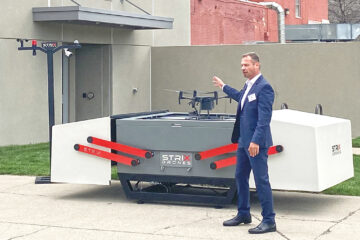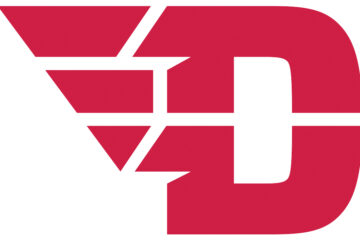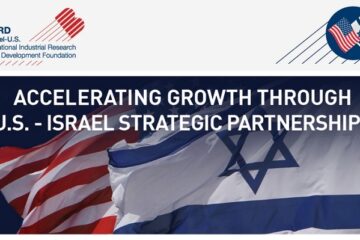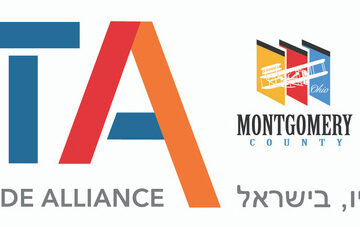Dayton scores Israeli start-up’s first U.S. smart water stations

Personal touch cements local trade alliance’s second shiddach with community college
Story and Photos by Marshall Weiss, The Dayton Jewish Observer
In August 2013, Montgomery County Commissioner Dan Foley read a story at the Times of Israel website about a start-up that was beta testing filtered drinking water stations on the streets of Tel Aviv. Two and a half years later, on Feb. 1, Sinclair Community College in Dayton became the first pilot site to test the water stations outside of Israel.
In between, Foley and the Dayton Region Israel Trade Alliance (DRITA) were determined to show Woosh water station co-founder and CEO Itay Tayas-Zamir their thirst for his project — lining up the city, county, and Sinclair as funders — and encouraging him to open a factory here to manufacture the water stations for the U.S. market if the product takes off.
“Dan Foley was the man who led the delegation to Israel,” Tayas-Zamir said at the Sinclair Woosh launch ceremony, “and the first person we met back in our factory in Israel. And to quote from a famous film, you had us with hello.”
Dayton is the only city in Ohio with its own economic development office in Israel. The Woosh pilot is evidence that the six-year-old DRITA has changed its strategy from pursuing sizeable contracts for the Dayton-area defense and R&D sector to connecting smaller operations in Israel to business opportunities in Dayton’s civilian and commercial markets.
DRITA, a collaborative of the City of Dayton, Montgomery County, and the Dayton Development Coalition, brought a trade mission to Israel a few months after Foley first read about Woosh. Three months later, Tayas-Zamir arrived in Dayton to continue the conversation.
Tayas-Zamir said Woosh’s Smart Water Stations are aimed at those who buy water bottles on college campuses and pedestrians in urban areas.
Customers can take virtually any bottle or cup of their own (up to 32 oz.) and fill it with filtered, chilled tap water at a Woosh Water Station; the charge is 50 cents for up to 20 oz., 75 cents for 32 oz., payable by credit card or through a pre-purchased subscription.
For another 15 cents, customers can cleanse a drinking bottle before reuse, with the station’s 03 purification system.
“One of our challenges is to convince people to stop buying the next bottled water,” Tayas-Zamir said. “We’re promoting tap water. Because, actually, bottled water is tap water (that’s) filtered, shipped, and that’s unbelievable in terms of carbon emissions. You get the same quality pure water without the plastic. So you save the environment and money. We want to encourage people again and again to use their own bottle.”
After testing five Woosh water stations in Tel Aviv for more than two years, Tayas-Zamir was as ready to enter the U.S. market as DRITA was to have him start here.
“The U.S. market is by far the biggest market for bottled water,” he said.
Potential jobs
Sinclair Community College now has three Woosh Smart Water Stations: at the Tartan Marketplace in Building 7, the Main Street Café in Building 10, and in Building 14 at the walkway to the student parking lot. Students can use their Tartan Cards to purchase Woosh water and cleanse their bottles for reuse.
Woosh has invested $200,000 in the pilot, and received a grant of $100,000 from Israel’s Ministry of Economy for the project in Dayton. Sinclair, the county, and the city each paid Woosh $25,000 to become partners on the pilot project. The payoff to DRITA would be a Woosh manufacturing facility with 200-plus jobs based in Dayton to serve the U.S. market.
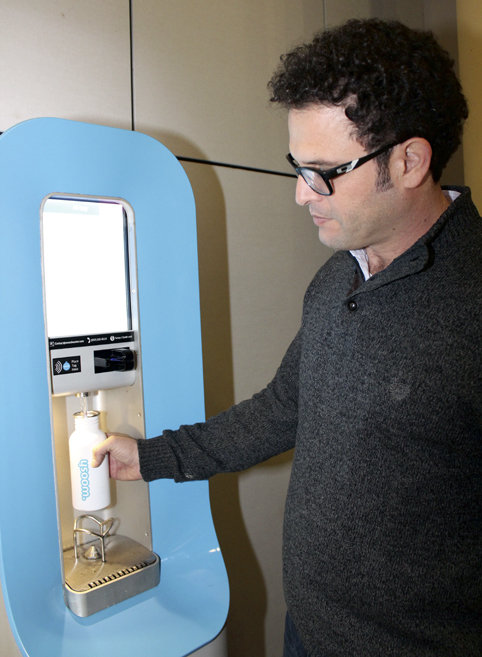
The pilot water stations were manufactured in Petah Tikvah by the Odis Group. “We came with the innovative technology, and they came with the extensive experience in water infrastructures,” Tayas-Zamir said. The cost to build each pilot machine, he said, was about $22,000.
For now, he has contracted with DeBra-Kuempel Mechanical-Electrical in Moraine to maintain the stations here.
“Our plan,” Tayas-Zamir said, “is the moment we would have the critical mass of units that need to be manufactured in the U.S., we would move the manufacturing here, because it doesn’t make sense to ship them from Israel.”
He added that 50 units in the United States is his threshold for critical mass.
“The next project, hopefully, would be in Miami Beach,” he said. “It’s like Tel Aviv in a way, everything would be outdoors.” Woosh is already in contact with other universities and colleges in the United States. “The potential here in the U.S. could be for 10,000 stations.”
“We’re happy that this is going to be a long-term relationship,” Foley said at Sinclair’s opening ceremony for Woosh. “We think that as Itay sells more units around the country, we believe that with our manufacturing companies, that with our workforce, we can make these machines here in Dayton, Ohio.”
“It didn’t take us long to realize that we found a home away from home,” Tayas-Zamir said. Four of his seven-person team are renting a house in Bellbrook for two weeks while they oversee the Sinclair pilot.
“What we really liked is the combination of openness to innovation, and meeting with the folks from Sinclair — we really like the vibe here. Students are early adapters. The campus is really forward-thinking in that way.”
Tayas-Zamir, 38, studied at The Heschel Sustainability Center in Tel Aviv and has worked in the water technology sector; he made a point to involve Sinclair’s sustainability club in the project.
“This will be one of their research topics,” he said. “We want to see how many bottles we can save here, what would be the CO2 carbon emissions decrease due to the lesser consumption of plastic bottles.”
Sinclair Associate Prof. of Reading and ESL Barbara Gilbert, who advises the sustainability club with her husband, Sinclair Prof. of Energy Management Technology Dr. Robert B. Gilbert, said the dozen members of the club have been meeting with Tayas-Zamir since last summer to prepare for the launch.
“We’re going to be standing in front of the posts for the next two weeks, introducing them to students, teaching them how to use it,” said Ron Hinrichsen, president of the club. “It’s important that this project gets traction early so that it can spread. Because this is long overdue. And it would be nice to have these in lots of different public areas, exercise places, parks, you name it.”
A week before the opening, Tayas-Zamir also began working with marketing students at Sinclair. “The idea is to get their insights and then to go through maybe rebranding, repositioning for the U.S. market,” he said.
Learning curve
DRITA had some early successes brokering tech and aerospace partnerships even before opening a trade office in Israel in 2010. The alliance marks the only formal trade relationship the Dayton area has with a foreign country.
Dayton is home to Wright-Patterson Air Force Base and the Air Force Research Laboratory.
But the next four years yielded only two partnerships between Israeli and Dayton-area businesses.
Montgomery County Administrator Joe Tuss said a challenge to connecting Dayton region defense and aerospace contractors with Israeli companies comes from issues of international intellectual property.
“You have to be 100-percent ITAR (International Traffic in Arms Regulations) certified before you can even enter into any of these conversations, which goes through the State Department because it’s all about intellectual property and trade secrets,” Tuss said. “And the Israelis are just as stringent about that as we are in the U.S. So trying to get those companies working together — talking about the same thing and figuring out where there is an intersection that can result in real business applications — is a heck of a lot harder than I think any of us ever thought it would be.”
Tuss said the opportunity for defense and aerospace partnerships comes indirectly through American aid to Israel.
“When Israel’s defense sector gets aid from the U.S., it comes in the form of credits,” Tuss said. “There’s a certain amount that needs to be spent back with U.S. companies, so there’s a real opportunity here. We’ve been trying to figure out how that works for the last five years, for military funds. Most of that foreign military spending goes to big companies, but there’s probably, on an annual basis, $400-$450 million of spend that’s specifically designated for small to midsize companies.”
Dayton Development Coalition President and CEO Jeff Hoagland said he’s learned that patience is key to cultivating the Dayton-Israel relationship.
“The number one thing, every time we’re over there — especially in defense and aerospace — they want to get into Wright-Patt, most specifically the Air Force Research Laboratory,” Hoagland told a gathering of Dayton’s Jewish Community Relations Council in January. “The other thing is, a lot of the Israeli companies that we met with, (while) our goal is to get those companies here, they want us to go over there and invest in them there.”
If it was only about the money invested in DRITA, Tuss said, “we wouldn’t get anybody.” In the end, he said, it’s about people and relationships.
DRITA’s total budget is $250,000 for 2016, with $141,000 directed toward its office in Tel Aviv.
“If Florida has a pot of $2 million, that is only for their Israel initiative,” said DRITA’s local staffer, Montgomery County Economic Development Specialist Pamela Fannin. “Massachusetts, Maryland, Georgia all have a million dollars.”
‘It’s the people’
DRITA upped its charm offensive when it hired Hadas Bar-Or of Tel Aviv to take over its trade office in 2014. Bar-Or, formerly the trade representative to Israel for Massachusetts, has since facilitated hundreds of introductions between the Dayton region and Israeli entities, mostly in the tech sector.
In August 2015, after five years without brokering a formal agreement, DRITA was able to celebrate Sinclair’s partnership with Simlat Ltd. of Herzliya, when the community college cut the ribbon on its National UAS Training and Certification Center.
Simlat has customized its UAS training simulation systems for use at Sinclair’s UAS center.
“What I would call a differentiator for the Simlat system is that we’re able to take our ground control stations that we use with our real vehicles when we’re flying in the national airspace, and we’re able to integrate them and use them in the simulation product,” said Jeffrey Miller, Sinclair’s assistant vice president of workforce development. “You can’t do that with the other products that we have. There are also really good teaching tools with the system, so you can assess somebody’s performance using the simulation product and understand what the issues are that they need to work on.”
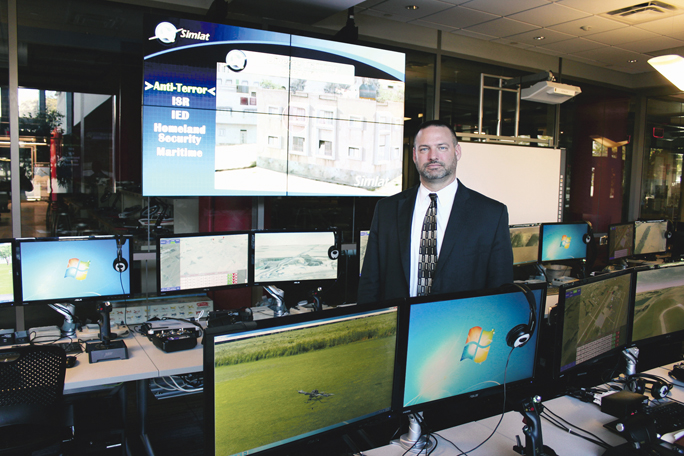
Miller said the aim of the UAS center is to create a pipeline of qualified UAS employees for the soon-to-emerge civil and commercial U.S. market.
“Given that UAS is relatively new, Simlat is a fairly mature product, a relatively small company,” Tuss said. “This has been five years in the making. We met Simlat on one of the trade missions. And this is one of the missions that Sinclair was on.”
“Throughout the years, DRITA was instrumental in keeping both parties in mind and evaluating when would be the right time to move forward and work together,” Simlat President Yuval Peshin explained in an email. Sinclair invested $750,000 to incorporate Simlat platforms in its UAS training.
Fannin said there are now approximately 25 nondisclosure agreements that DRITA has facilitated across composite technology, digital, and medical sectors.
DRITA has renewed Bar-Or’s contract to oversee its trade office in Israel through the end of 2017.
Woosh head Tayas-Zamir praised DRITA’s Fannin, who helped him bridge U.S.-Israeli cultural differences.
“DRITA makes it really easy for Israel start-ups to enter the U.S. market,” he said. “We learned a lot how to really work with authorities in the U.S. by that process. And that was critical. Without that, we wouldn’t be here.”
DRITA taught Woosh how to form an LLC, showed Tayas-Zamir potential sites for a factory, and connected him with The Ohlmann Group to handle Woosh’s PR and marketing.
When asked why he ultimately selected Dayton for Woosh’s pilot, Tayas-Zamir said, “At the end, it’s everything on a personal level. You like to partner with people you like. If you ask me, this is the real reason we’re here. It’s the people.”
To read the complete March 2016 Dayton Jewish Observer, click here.


